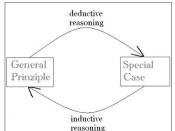Let us take all knowledge systems to be a vast intricate structure. Faith is the foundation of this structure, because certain fundamental assumptions are made on which all knowledge systems are based. We use reason to continuously build upon this foundation the beautiful and complex structure of knowledge. Without these fundamental assumptions or axioms which cannot be justified nor refuted by reason, the structure of knowledge would collapse and there would be no way to construct any sort of knowledge system. My purpose in this essay is to establish the validity of this assertion and to demonstrate that not only is faith a legitimate basis for knowledge claims in religion, but also in all areas of knowledge.
To start with, in order to effectively answer a question concerning "religious beliefs", we must first define the term. Obviously, there are many different religions, each with different beliefs. However to take anything which is proclaimed to be religious belief by any people into account would over-complicate the issue.
It is difficult to say exactly what should be classified as religious belief and what should not. Where I live in China, some believe that life ends at physical death while others see reincarnation as the very foundation of religious beliefs, while my Iranian cultural background tells me that it is no more than ignorant superstition. In Islam, it is believed that after death, at an appointed time, all would rise from their sepultures and in the view of the good deeds or sins they committed during their earthly lives, would accordingly be sent to heaven or hell. However, my Baha'i belief claims that after the death of the body, the soul continues it's existence and its efforts to advance will persist after death. It is thus very important we be...


